
She Stoops to Conquer is a comedy by Oliver Goldsmith, first performed in London in 1773. The play is a favourite for study by English literature and theatre classes in the English-speaking world. It is one of the few plays from the 18th century to have retained its appeal and is still regularly performed. The play has been adapted into a film several times, including in 1914 and 1923. Initially the play was titled Mistakes of a Night and the events within the play take place in one long night. In 1778, John O'Keeffe wrote a loose sequel, Tony Lumpkin in Town.

The A.B.C. Murders is a work of detective fiction by British writer Agatha Christie, featuring her characters Hercule Poirot, Arthur Hastings and Chief Inspector Japp, as they contend with a series of killings by a mysterious murderer known only as "A.B.C.". The book was first published in the UK by the Collins Crime Club on 6 January 1936, sold for seven shillings and sixpence (7/6) while a US edition, published by Dodd, Mead and Company on 14 February of the same year, was priced $2.00.

Freaky Friday is a comedic children's novel written by Mary Rodgers, first published by Harper & Row in 1972. It has been adapted for several films namely by Disney and these include 1976, 1995, 2003 and 2018.

The Real Inspector Hound is a short, one-act play by Tom Stoppard. The plot follows two theatre critics named Moon and Birdboot who are watching a ludicrous setup of a country house murder mystery, in the style of a whodunit. By chance, they become involved in the action causing a series of events that parallel the play they are watching.
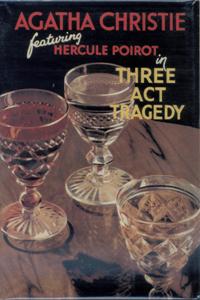
Three Act Tragedy is a work of detective fiction by British writer Agatha Christie, first published in the United States by Dodd, Mead and Company in 1934 under the title Murder in Three Acts and in the UK by the Collins Crime Club in January 1935 under Christie's original title. The US edition retailed at $2.00 and the UK edition at seven shillings and sixpence (7/6).
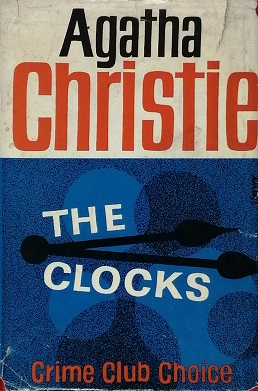
The Clocks is a work of detective fiction by British writer Agatha Christie, first published in the UK by the Collins Crime Club on 7 November 1963 and in the US by Dodd, Mead and Company the following year. It features the Belgian detective Hercule Poirot. The UK edition retailed at sixteen shillings (16/-) and the US edition at $4.50.

The Glass Wall is a 1953 American drama film noir directed by Maxwell Shane and starring Vittorio Gassman and Gloria Grahame. The black-and-white film was produced and distributed by Columbia Pictures. The title refers to a design feature of the United Nations headquarters in New York City.
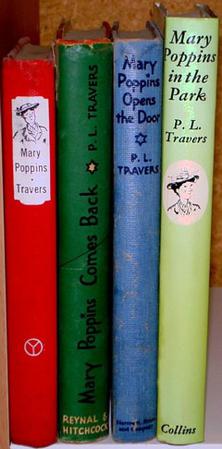
Mary Poppins is a series of eight children's books written by Australian-British writer P. L. Travers and published over the period 1934 to 1988. Mary Shepard was the illustrator throughout the series.
The Further Adventures of Sherlock Holmes is a series of radio dramas based on Arthur Conan Doyle's detective Sherlock Holmes. Written by Bert Coules as a pastiche of Doyle's work, the series was broadcast on BBC Radio 4 in 2002, 2004, 2008–2009 and 2010. There are sixteen episodes, all of them produced and directed by Patrick Rayner of BBC Scotland. Clive Merrison stars as Holmes, having portrayed the detective in a 1989–1998 BBC radio series of dramatisations of every Sherlock Holmes story by Doyle. Andrew Sachs appears as Dr. Watson, replacing Michael Williams after Williams died following the Radio 4 run of Sherlock Holmes adaptations. Each of the stories is based on a throwaway reference from an actual Doyle short story or novel. The first two series are repeated regularly on BBC Radio 4 Extra.
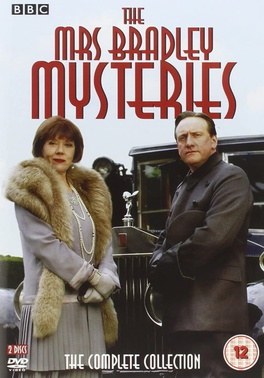
The Mrs Bradley Mysteries is a British drama series starring Diana Rigg as Adela Bradley, and Neil Dudgeon as her chauffeur George Moody. The series was produced by the BBC for its BBC One channel between 31 August 1998 and 6 February 2000, based on the character created by detective writer Gladys Mitchell. Five episodes were produced, including a pilot special. Stylish images of the 1920s are featured, including a classic Rolls-Royce limousine and art deco fashions and jewellery worn by the title character.
Helen Gilmore was an American actress of the stage and silent motion pictures from Louisville, Kentucky. She appeared in over 140 films between 1913 and 1932.
Betty's Summer Vacation is a play by Christopher Durang, which premiered Off-Broadway at Playwrights Horizons in 1999. Playbill observed that "The play is a fierce comeback for Durang, whose 'Sex and Longing' took a drubbing at Lincoln Center two seasons ago."

The Notorious Landlady is a 1962 American comedy mystery film starring Kim Novak, Jack Lemmon, and Fred Astaire. The film was directed by Richard Quine, with a script by Blake Edwards and Larry Gelbart based on the short story "The Notorious Tenant" by Margery Sharp.

Ralph du Vergier Truman was an English actor, usually cast as either a villain or an authority figure. He possessed a distinguished speaking voice. He was born in London, England.

Trelawny of the "Wells" is an 1898 comic play by Arthur Wing Pinero. It tells the story of a theatre star who attempts to give up the stage for love, but is unable to fit into conventional society.

Payroll is a 1961 British neo-noir crime thriller film directed by Sidney Hayers and starring Michael Craig, Françoise Prévost, and Billie Whitelaw. The screenplay by George Baxt was adapted from Derek Bickerton's 1959 novel of the same name. The film revolves around a group of criminals who plan and execute a wages robbery, which ultimately ends in disaster.
The Disappeared is a British thriller/horror film directed by Johnny Kevorkian and starring Harry Treadaway, Greg Wise, Tom Felton, and Ros Leeming.

Thumbs Up is a 1943 American musical drama film producted by Albert J. Cohen for Republic Pictures and directed by Joseph Santley. The film stars Brenda Joyce, Richard Fraser and Elsa Lanchester. The screenplay was written by Frank Gill Jr. based on a story idea by Ray Golden and Henry K. Moritz. Musical direction was by Walter Scharf, words and music by Sammy Cahn and Jule Styne respectively. The film was released on July 5, 1943.
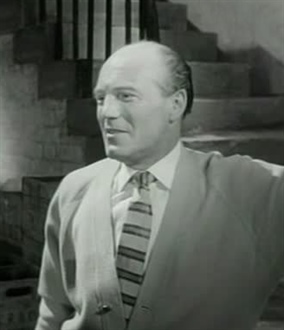
Arthur Lovegrove was a British actor and playwright. His comedy Goodnight Mrs Puffin starring Irene Handl, ran for 3 years in London's West End, from 1961.
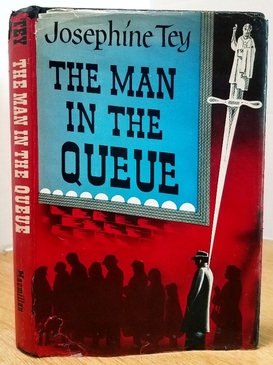
The Man in the Queue is a 1929 detective novel by the British writer Josephine Tey. It was the first in her series of six novels featuring the Scotland Yard detective Inspector Grant. It was released during the Golden Age of Detective Fiction. It was initially published under the pseudonym Gordon Daviot, and published by Methuen in London and Dutton in New York.















